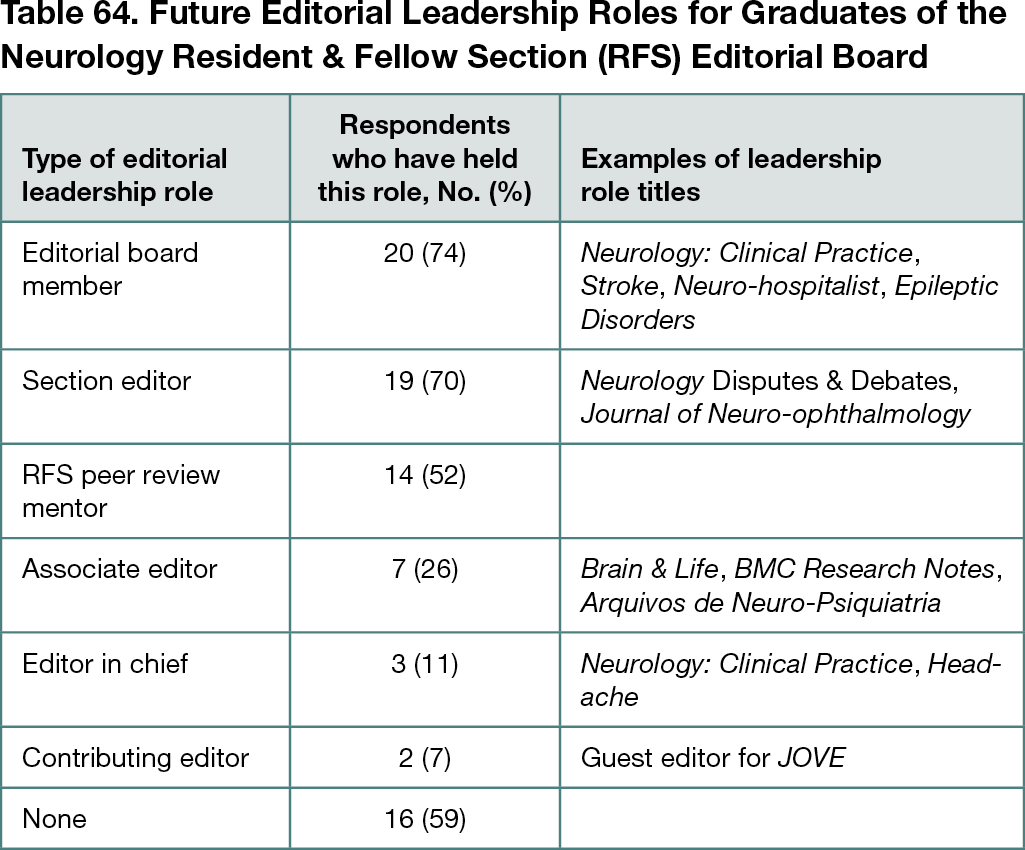Abstract
Developing the Next Generation of Editors and Reviewers Through a Trainee-Led Editorial Board in Neurology
Roy E. Strowd,1,4 Whitley W. Aamodt,2,4 Ariel M. Lyons-Warren,3 Kathleen M. Pieper,4 José G. Merino5
Objective
Since 2004, the Resident & Fellow Section (RFS) of Neurology has provided an outlet for neurology trainees and educators to publish manuscripts. The RFS board members are trainees selected annually for a 3-year term to serve as reviewers and learn publication science. The objective of this study was to assess the association of RFS board membership with (1) future leadership roles at academic journals, (2) peer review statistics, and (3) authorship.
Design
This retrospective cohort study was conducted with an embedded, nested case-control study. A cohort of all former RFS editorial board members was identified. For the nested component, cases consisted of editorial board members from 2018 to 2020, whereas controls were unselected applicants who made the penultimate round of candidacy. Demographic, reviewer, and authorship data including reviewer invitation acceptance rate, review completion rate (total number and past 12 months), review turnaround time, number of manuscripts submitted to Neurology, and acceptance rate in the 3 years following board application were collected via review of the BenchPress online submission system. Gender identity and whether each board member held a future leadership position in Neurology or other academic journals was collected via survey. Descriptive statistics were performed; unpaired t tests were used to compare peer review statistics between cases and controls.
Results
From 2004 to 2021, 77 trainees served on the editorial board; 50 were male (65%) and 7 were international (9%). Of this cohort, 31 (40%) served in 65 future editorial leadership roles at academic journals, including 20 who were editorial board members (Table 64), 14 who were RFS mentor-mentee peer review program mentors, 19 section editors, 2 contributing/guest editors, 7 associate editors, and 3 editors in chief. In addition, 41 (54%) continued to review for the RFS in 2021 and completed 291 reviews (mean [SD], 3.8 [7.0] reviews per graduate). In the past 3 years, 167 residents applied to the editorial board (mean [SD], 56 [10] applications per year). Compared with 23 controls who were not selected, 20 cases completed significantly more peer reviews over the following 3 years (mean [SD], 51.3 [21.0] vs 7.7 [12.0]; P < .001). Mean (SD) review turnaround time (cases, 7.2 [2.9] days vs controls, 6.7 [4.0]; P = .70), number of manuscripts authored (7.3 [9.0] vs 3.7 [4.0]; P = .11), number of manuscripts accepted (2.9 [3.0] vs 1.3 [2.0]; P = .09), and acceptance rate (43% vs 30%; P = .21) did not differ significantly.
Conclusions
A trainee-led editorial board prepares medical trainees to review manuscripts, publish content, and develop future passion in journalology. Although the association of board participation with authorship was not different from highly qualified controls and expectations of board membership is an important confounder, engagement in more peer review may promote interest in publication science.
1Wake Forest School of Medicine, Charlotte, NC, USA, rstrowd@wakehealth.edu; 2University of Pennsylvania, Pittsburgh, PA, USA; 3Department of Pediatrics, Section of Pediatric Neurology and Developmental Neuroscience, Baylor College of Medicine, Houston, TX, USA; 4Neurology; 5Georgetown University Medical Center, Washington, DC, USA
Conflict of Interest Disclosures
All authors are affiliated with the Neurology Resident & Fellow Section. Whitley W. Aamodt receives an editorial stipend as the deputy section editor. Ariel M. Lyons-Warren serves as chair of the Resident & Fellow Section Mentored Review Program, and Roy E. Strowd serves as the section editor. Kathleen M. Pieper is the senior managing editor of Neurology, and José G. Merino serves as editor in chief of the Neurology journals. Roy E. Strowd receives an editorial stipend as section editor and serves as a consultant for Monteris Medical Inc and Novocure; he has received stipends as an educational lecturer for Lecturio and Kaplan and has received research/grant support from the American Academy of Neurology, the American Board of Psychiatry and Neurology, the American Society for Clinical Oncology, the Southeastern Brain Tumor Foundation, and Jazz Pharmaceuticals. Kathleen M. Pieper and José G. Merino also receive compensation for their roles. No other disclosures were reported.
Acknowledgments
We thank our editorial team and peer reviewers for their time and commitment to the Neurology Resident & Fellow Section.

